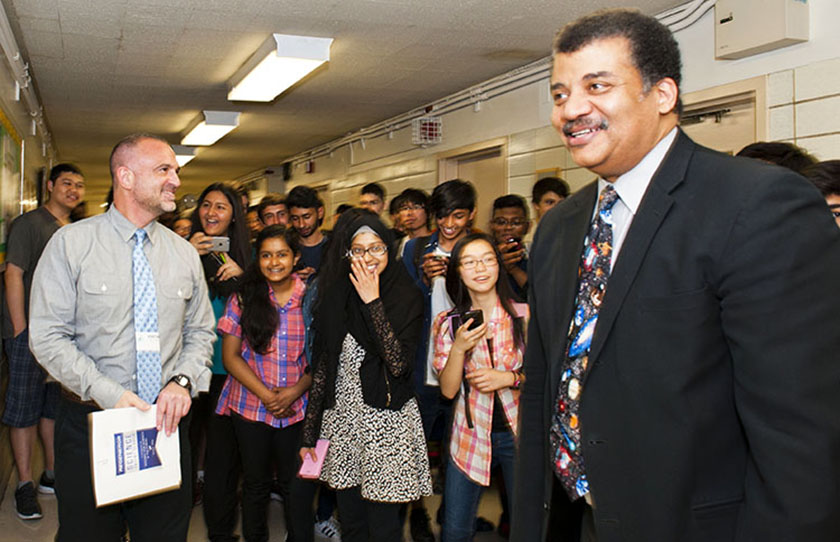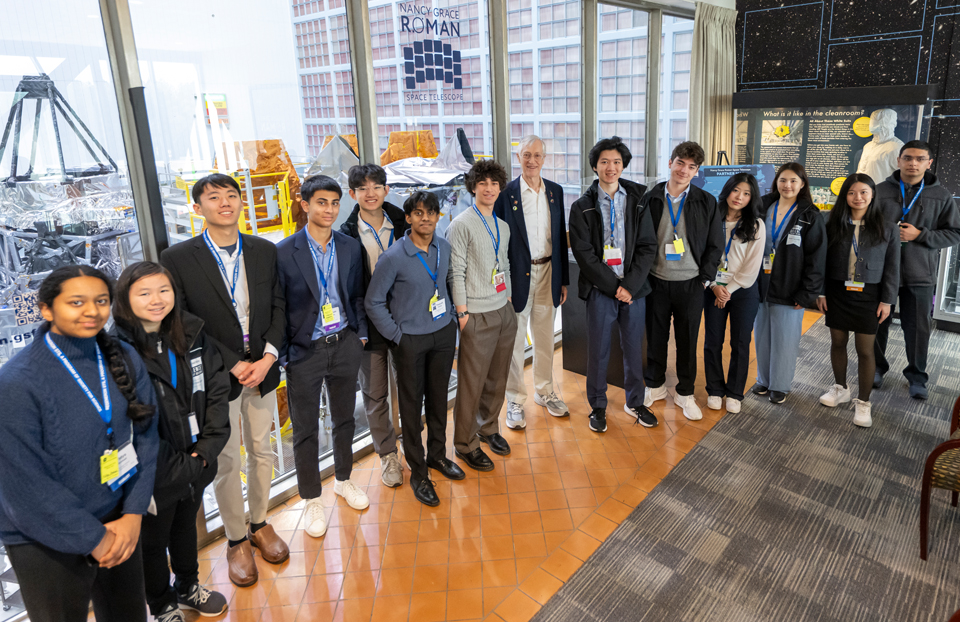Alumni, Regeneron STS, Science Talent Search
‘This sponsorship could take the country out of its science doldrums’

Neil deGrasse Tyson — yes, Neil DeGrasse Tyson, superstar science communicator, author, TV star, and director of the Hayden Planetarium in New York City — is excited Regeneron is the new sponsor of the Society’s Science Talent Search.
How excited? Enough to actually speak at the official sponsorship announcement on May 26 at the American Museum of Natural History in New York City.
Because anyone interested in science wants to know anything Dr. Tyson has to say about anything, we’re giving you his full remarks below. (The “George” he refers to below is Dr. George D. Yancopoulos, Regeneron’s founding scientist and chief scientific officer — as well as a high school classmate of Dr. Tyson’s at Bronx High School of Science).
But right up front, here’s his best line (we think): “The nation is in a kind of science doldrum right now, and it needs just this kind of investment.”
Read his remarks below:
NEIL DEGRASSE TYSON: George [Yancopoulos], after all that you described about what happened after graduation, I kind of felt like I needed my own biotech company to found. I feel like I got left out.
View the full livestream of the announcement.
In the interest of disclosure, let me make clear I was not a winner of the Science Talent Search. I was not even a semifinalist. In fact, I didn’t even enter the contest at all.
So I’m here not because I have some special memory of being a participant, but because I was George’s classmate at the Bronx High School of Science, and he was our valedictorian that year. I can say without hesitation that I didn’t even enter the contest, but that didn’t matter.
The fact is I had friends who entered the contest, and the knowledge that they were doing this created a landscape of learning, an atmosphere of discovery, and we were all participants, vicariously, if not directly, in cosmic discovery, and biological discovery, and mathematical discovery, because they were our friends. And the casual talk between classes was “What did you discover today?”
The knowledge that they were [participating in the Science Talent Search] created a landscape of learning, an atmosphere of discovery.
So, for me, that atmosphere mattered. There was the privilege of attending such a school, the Bronx High School of Science, but I can say again without hesitation that no matter the school across the country where this prize manifests, you’re going to be honored and respected by your classmates because they’ll know what kind of effort, and investment of time and energy, and ambition that it requires. And you cannot underestimate the value of what it is to foster an atmosphere of learning, and that can happen anywhere at any institution.
Now [George] is funding the next 10 years of the Science Talent Search.
When George approached me just to get my comments on this decision that the company is making, I said, “Yeah, do it.” But then I was ready to follow up on that. In my head I said to myself, “You know, to make it as egalitarian as possible, you’re going to have to sort of broaden the base of this. It shouldn’t just be focused at the prestigious schools.”
Learn more about the Regeneron STS.
And before that could come out of my mouth, he said, “You know what we want to do different this time? We want to make sure that there’s access to opportunity in places where that had not been before.”
We want to make sure that there’s access to opportunity in places where that had not been before.
And I said, “He doesn’t need me. I’ll just shut up. He knows exactly where he wants to take this sponsorship.” And so then I said, “Plus, by the way, an interest in science kind of had to happen a little before you enter this contest.” You’re not saying, “Gee, I don’t know what I want to do. Okay, I’ll enter a Science Talent Search which is the Nobel Prize.” No, the seed has to be in there a little earlier, and where does that come from? From places like this, the American Museum of Natural History, or any museum across the country. That’s where you go when you’re in elementary school. That’s where your parents take you.
Help get the nation out of the science doldrums! Become a member of the Society today.
Research and education has shown that school trips taken in elementary school are remembered long into adulthood. And I can testify to that right now. In a room of adults, do you remember school trips you took in third grade? Yes, you do. Even when you don’t even remember the teacher’s name or your classmates’ names.
This sponsorship could take the country out of its science doldrums.
I remember a trip we took in second grade — we visited the post office. It was walking distance. But you remember it because you were not in school, you were in another environment. It’s something that today the National Science Foundation calls informal education.
So these are the seeds planted within children, and those seeds gain deep roots. And then you enter high school and you say, “Wow! This is what I want to be when I grow up. I’m ready for it. I’m primed.”
So I see the sponsorship as something that could possibly take the country out of its science doldrums. You know what the doldrums are? It’s a region on Earth’s surface where air does not flow horizontally. It either goes directly downward, or directly upward, or does not move at all. If you sail accidentally into that zone and all you have is wind power, you die there. Ships would have to avoid those regions because they didn’t have outboard motors to get them out of the doldrums.
The nation is in a kind of science doldrum right now, and it needs just this kind of investment to kick it.
The nation is in a kind of science doldrum right now, and it needs just this kind of investment to kick it — you know where — to kick it, to reactivate what George and I remember as a priority for science so many decades ago. The kind of priority that got us to the moon, that cured diseases, that gave us a hope for the future.
These are forces operating on us, like the World’s Fair in the 1960s. The World’s Fair didn’t shape that decade. That decade shaped the dreams of that World’s Fair. We all wanted a future that was better, and we all knew you were only going to get a better future if you invested in the science, technology, engineering, and math that enabled it.
So I tip my hat to George. I remember when he became valedictorian. I said, “Okay, that’s good, coming along there.” It was after he won the [Science Talent Search] prize, and then a few years later, “Oh, he’s founded a company. Okay.” A few years later, he got the M.D., Ph.D. “George is coming along nicely,” I remember saying to myself. Then he founded a company and I said, “Good, good.”
You might ask if I am proud of him for all of this. No, that’s not the right emotion. So he founds a company, the company goes public, and then I said, “All right, this is good.”
Now he’s funding the next 10 years of the Science Talent Search. All I can say regarding George in this regard is that it’s not that I am proud of him. It’s that if he hadn’t done all this, I would have been disappointed in him.


